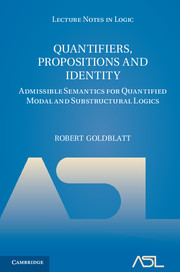 Quantifiers, Propositions and Identity
Quantifiers, Propositions and Identity Published online by Cambridge University Press: 07 September 2011
This book is about the possible-worlds semantic analysis of systems of logic that have quantifiers binding individual variables. Our approach is based on a notion of “admissible” model that places a restriction on which sets of worlds can serve as propositions. We show that admissible models provide semantic characterisations of a wide range of logical systems, including many for which the well-known model theory of Kripke [1963b] is incomplete. The key to this is an interpretation of quantification that takes into account the admissibility of propositions.
This is a subject that bristles with choices and challenges. Should terms be treated as rigid designators, or should their denotations vary from world to world? Should individual constants and variables be treated the same in this respect, or differently? Should each world have its own domain of existing individuals over which the quantifiable variables range, or should there be just a single domain of individuals? If there are varying domains, how should they relate to each other? Can any function from worlds to individuals be regarded as the “meaning” of some individual concept? Should an arbitrary mapping from individuals to propositions be admissible as a propositional function? Can we deductively axiomatise the class of valid formulas determined by each answer to these questions?
To save this book to your Kindle, first ensure [email protected] is added to your Approved Personal Document E-mail List under your Personal Document Settings on the Manage Your Content and Devices page of your Amazon account. Then enter the ‘name’ part of your Kindle email address below. Find out more about saving to your Kindle.
Note you can select to save to either the @free.kindle.com or @kindle.com variations. ‘@free.kindle.com’ emails are free but can only be saved to your device when it is connected to wi-fi. ‘@kindle.com’ emails can be delivered even when you are not connected to wi-fi, but note that service fees apply.
Find out more about the Kindle Personal Document Service.
To save content items to your account, please confirm that you agree to abide by our usage policies. If this is the first time you use this feature, you will be asked to authorise Cambridge Core to connect with your account. Find out more about saving content to Dropbox.
To save content items to your account, please confirm that you agree to abide by our usage policies. If this is the first time you use this feature, you will be asked to authorise Cambridge Core to connect with your account. Find out more about saving content to Google Drive.